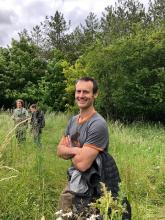Professional summary
Ben's work focuses on reducing the impacts of modern agriculture on the wider environment, particularly how we can maintain productivity while reducing the consequences for wider biodiversity. This work considers how farmers can benefit from ecosystem services such as crop pollination and natural pest control. Integrating these species in a sustainable way into farming systems is critical to the long-term viability of UK agriculture, but achieving it is complex, depending in part on the creation of semi-natural habitats through agri-environmental schemes and the more effective use of pesticides.
In a wider sense he is interested in the drivers of invertebrate biodiversity loss in agricultural systems as well as more broadly. Ben's recent research has looked at the impact of pesticide use for pollinator communities, including work for Defra aiming to develop a long-term post regulatory approval indicator of risks for honeybees. He has worked on projects funded by NERC, DEFRA, Natural England and the Health and Safety Executive as well as for industry looking at the impacts of neonicotinoid pesticides.
Ben has been interviewed on Women's Hour, The BBC 6 O'clock News, ITV, BBC Inside Science and several print and online media outlets. His studies have been quoted by politicians and he received an RSPB Centre for Conservation Science award for best conservation science paper of 2015.
He regularly gives invited talks for a scientific and lay audiences, has appeared on podcasts for the farming community and presented at the European Parliament Greening Partnership Day.
Web tools and apps
My work focuses on reducing the impacts of modern agriculture on the wider environment, seeking to understand how we can maintain agricultural productivity while reducing the consequences that this has for wider biodiversity. This work has focused on how farmers can benefit from ecosystem services such as crop pollination (e.g. provided by bees) and natural pest control (e.g. provided by predatory insects like beetles). Integrating these species in a sustainable way into farming systems is critical to the long-term viability of UK agriculture, but achieving this is complex depending in part on the creation of semi-natural habitats though agri-environmental schemes (including flower rich field margins and grassland recreation) and the more effective use of pesticides.
In a wider sense I am interested in the drivers of invertebrate biodiversity loss in agricultural systems as well as more widely in the UK and elsewhere. My recent work has focused on the impact of pesticide use for pollinator communities, including work for Defra aiming to develop a long term post regulatory approval indicator of risks for honeybees. I have worked on projects funded by NERC, DEFRA, Natural England and the Health and Safety Executive as well as for industry looking at the impacts of neonicotinoid pesticides for Syngenta and Bayer.
My work focuses on reducing the impacts of modern agriculture on the wider environment, seeking to understand how we can maintain agricultural productivity while reducing the consequences that this has for wider biodiversity. This work has focused on how farmers can benefit from ecosystem services such as crop pollination (e.g. provided by bees) and natural pest control (e.g. provided by predatory insects like beetles). Integrating these species in a sustainable way into farming systems is critical to the long-term viability of UK agriculture, but achieving this is complex depending in part on the creation of semi-natural habitats though agri-environmental schemes (including flower rich field margins and grassland recreation) and the more effective use of pesticides.
In a wider sense I am interested in the drivers of invertebrate biodiversity loss in agricultural systems as well as more widely in the UK and elsewhere. My recent work has focused on the impact of pesticide use for pollinator communities, including work for Defra aiming to develop a long term post regulatory approval indicator of risks for honeybees. I have worked on projects funded by NERC, DEFRA, Natural England and the Health and Safety Executive as well as for industry looking at the impacts of neonicotinoid pesticides for Syngenta and Bayer.
